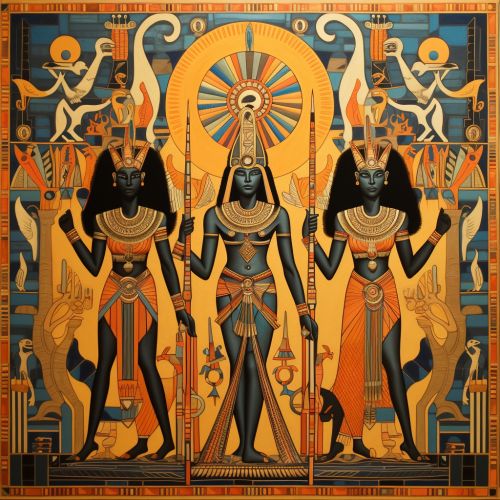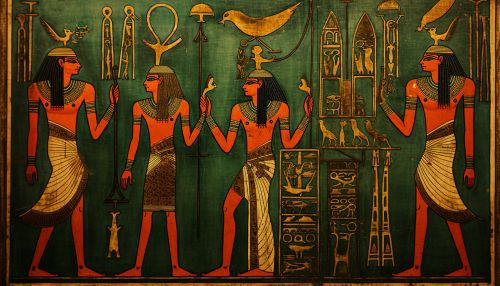Egyptian gods
Introduction
The ancient Egyptian pantheon is a complex and fascinating topic, encompassing a multitude of deities that were worshipped over the course of thousands of years. These gods and goddesses played integral roles in the spiritual lives of the Egyptians, influencing everything from creation myths to daily rituals.


Overview
The Egyptian gods were numerous and diverse, with each deity possessing unique characteristics, symbols, and domains. They were often depicted as anthropomorphic beings, possessing human bodies with the heads of animals or birds, or as fully human or fully animal. Some gods were associated with specific regions or cities, while others had a more universal presence throughout Egypt.
Major Deities
Ra
Ra, the sun god, was one of the most important deities in the Egyptian pantheon. He was often associated with the pharaoh and the concept of divine kingship. Ra was believed to travel across the sky in a solar barque, bringing light to the world and maintaining the cycle of day and night.
Isis
Isis was a goddess of magic, motherhood, and fertility. She was known for her wisdom and her role in the Osirian resurrection myth, where she resurrected her husband Osiris after his murder by his brother Set. Isis was often depicted with wings or a throne-shaped headdress, symbolizing her protective nature and her status as a queen of the gods.
Osiris
Osiris was the god of the underworld, resurrection, and fertility. He was the first pharaoh of Egypt, according to myth, and was murdered by his brother Set. However, through the magic of Isis, he was resurrected and became the ruler of the afterlife, judging the souls of the deceased.
Horus
Horus was the falcon-headed god of the sky, war, and hunting. He was the son of Isis and Osiris and was known for his conflict with Set over the throne of Egypt. Horus was often associated with the pharaoh, who was considered his earthly incarnation.
Anubis
Anubis, the jackal-headed god, was associated with mummification and the afterlife. He was believed to guide the souls of the deceased through the underworld and to oversee the weighing of the heart, a crucial aspect of the journey to the afterlife.
Lesser-Known Deities
While the major deities are often the most recognized, the Egyptian pantheon also included a vast number of lesser-known gods and goddesses. These deities often had more specialized roles or were associated with specific localities.
Bastet
Bastet, the lioness or cat goddess, was associated with home, fertility, and childbirth, as well as protection against evil spirits and disease. She was particularly revered in the city of Bubastis.
Thoth
Thoth, the ibis-headed god, was the patron of scribes and writing. He was also associated with wisdom, magic, and the measurement of time.
Sekhmet
Sekhmet, the lioness goddess, was a fierce warrior deity and the goddess of healing. She was believed to breathe fire and was often invoked for protection in battle.
Worship and Rituals
The worship of the Egyptian gods involved a variety of rituals and ceremonies, many of which were conducted by priests in the temples. These rituals often involved offerings of food, drink, and other goods to the gods, as well as the recitation of hymns and prayers.
Conclusion
The gods of ancient Egypt were central to the culture's understanding of the world and their place in it. They provided explanations for natural phenomena, offered protection and guidance, and were integral to the Egyptians' concepts of morality and the afterlife. Despite the passage of millennia, these deities continue to captivate us with their complexity and the glimpse they provide into the beliefs of an ancient civilization.
